With seemingly everyone trying to stake their claim in the burgeoning esports market, one Ottawa native offers his insight on how he’s invested nearly $400,000 CAD betting on games you may never have even heard of.

It’s a classic gambler’s trope that a true degenerate (a term we’ve grown to use lovingly) will bet on anything. With sports betting working its way into nearly every conversation even tangentially related to sports these days, the time is now to give it a full send on that “KSI to knock out Logan Paul†bet before their celebrity boxing match this August.
If you didn’t already know that bets like this were out there, the short answer is, it’s 2018. You can wager on everything from the results of individual at bats of a Mets game in real time, to the birth weight of the next relevant celebrity baby. And as competitive professional gaming leagues — also known as esports — have developed, more and more gamblers have come out of the woodwork to bet on them. With Business Insider conservatively estimating that the esports gambling market is worth $900 million as it stands in 2018, and Eilers & Krejcik Gaming estimating that value to double by 2020, unfortunately for the crotchety old folks in the comments of all of ESPN’s gaming-related Facebook posts, these contests are going to continue to be a topic of conversation.
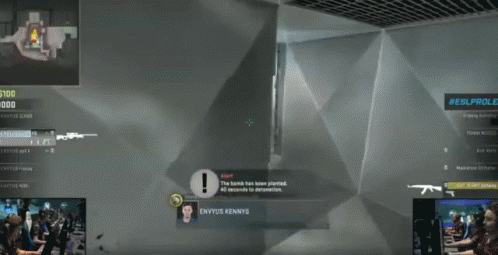
One of the most recognizable Counterstrike players of all-time, KennyS, shows off his world famous AWP skills to secure a round win.It makes sense that with esports viewership rising, so has the commotion around betting on them. Many games have had a long history of gambling internally that should have told us that this was going to be a thing sooner rather than later. Most notably, Counterstrike players have been gambling skins (purely cosmetic art for in game weapons) since random skin rewards were introduced in 2013. What began as the developers simply trying to bolster the game’s community became a thriving digital black market with the rarest skins often being worth in excess of $25,000 while trading hands over roulette and dice game results. So yeah, it’s that serious.
If you’re into wagering on your videogames the old-fashioned way (if there is one), online books offer the traditional odds where bettors can put their money down on the results of matches (the moneyline or spread), like you’d expect to see offered for any of the major sports. Bettors can also throw their hat in the ring on prop bets like character picks, who’ll get the first kill, and other game-specific events. These prop bet options (bets not concerned with or affected by the outcome of the game) are often limited to more high-profile matches, but if you’re willing to risk it on one of the shadier internet books, generally someone will take your money on just about anything, not unlike any other sport.
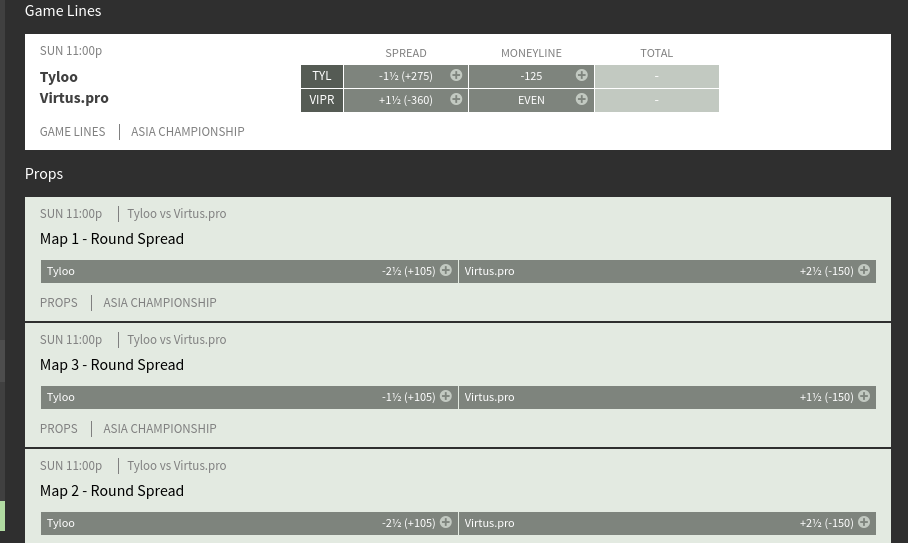
An example of what bookmakers like Bovada have to offer for betting on esports matches, in this case, Counterstrike.For Marcus “sixf0ur†Shea, founder of esportsforecasts.com, this market is worth playing, evidenced by the fact that he’s wagered nearly $400,000 CAD on it over the past two years. Shea got his start in finance, and then managed to, for lack of a better word, parlay, our adoration for shows like American Idol, and more importantly, our love for gambling, into a newfound career. Luckily for all of us, I was able to pick his brain and get the full story.
It starts in 2011. After earning his Master’s in Mathematics from the University of Waterloo, he landed what to many would be the job of a lifetime working for The Bank of Montreal as a quantitative analyst on Bay St, AKA he was the guy double-fisting espresso on the trading floor while somehow also yelling into his flip-phone and angrily snapping it closed every ten minutes. Once he started to apply that same expertise to betting, he found himself engulfed in a hobby that would steadily inch it’s way toward a career.
After 5 years of working for The Bank of Montreal, pricing billions worth of assets everyday, it proved to be just as stressful as you could expect. Considering I hyperventilate at the thought of losing the modest amounts I’m used to betting, I’ll take his word on how stressful life was as a quant if he was willing to become a professional gambler to escape that stress.
He built a bankroll using a program he had developed to shop odds on American Idol results offered on various online sportsbooks, namely Betfair and Pinnacle, and find arbitrage bets, or bets where he could still make a profit after betting all possible outcomes due to odds discrepancies between the books. These discrepancies generally arise most commonly within less popular betting events where books are more likely to offer significantly varying odds, or simply make a mistake in setting the market price. A word to the wise, and this should go without saying, this is easier said than done. Even if we’re talking American Idol odds, there’s a reason the house does so well in the big picture. Looking into the action around American Idol really strengthens the case that Sanjaya being a finalist was an inside job, but I’m going to leave that be for now.
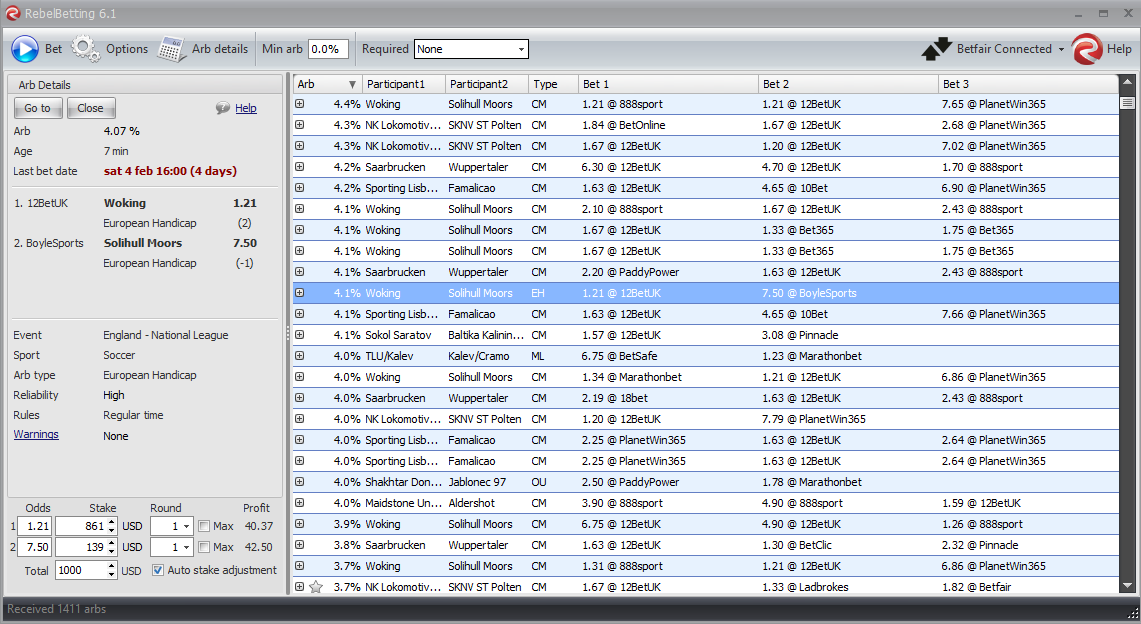
A screenshot from the popular arbitrage betting software RebelBettingWhen Betfair, a popular online sportsbook, closed the digital door on Canadian citizens after merging with Irish betting service Paddy Power in 2015, Shea needed to look for other options. Part of what makes esports betting so appealing is that many bettors, like Shea, still see it as a market with high edge potential (potential to beat the books betting on lines they may not put the proper time or expertise into setting accurately). It was the logical next step, oddly enough.
So, starting from a humble(ish) Excel spreadsheet model to help predict the outcome of DOTA 2 games, he began to shift his focus from finding surefire arbitrage bets, to bringing in as much esports results data as possible and betting according to conclusions he was able to draw from the trends defined in his model. Essentially, his model assigns each team a rating based on their performance history, compares that with the rating of their opponent, and offers bettors a percentage chance that Team A or Team B will win. While model betting still carries risk, modeling is designed to let you as a bettor know where the value bets are, and allow you to slowly build profit over time. Long story short, it’s definitely better than throwing darts at a dartboard and throwing some money around on those results.
After finding some much-needed success betting on DOTA with the help of the Reddit esports community, he expanded to a program of his own development that was capable of handling the raw results data from four more esports: League of Legends, Overwatch, Heroes of the Storm, and Counterstrike.
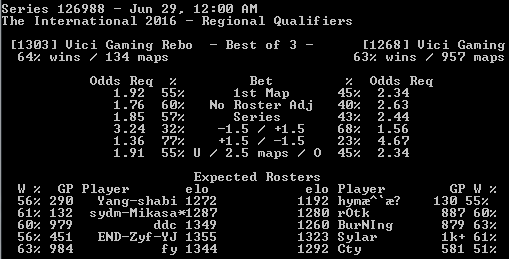
At this point in the story, Shea’s model looks something like this.In true Moneyball fashion, this is right about the time in the story where the house comes calling. But really, they did. You can’t make this shit up. In late 2016 Marco Blume, the President of Pinnacle, where he had been using for the bulk of his betting, reached out to Shea looking to talk shop about all things esports. According to Blume, esports were the fastest growing market in the world of sports betting, even overtaking hockey in terms of total volume wagered in their book, so it makes since they could stand to learn a thing or two from someone like Shea. But when they offered him what would essentially amount to an entry level position working in their sportsbook, he doubled down and rejected it, choosing to continue to be his own boss with Esportsforecasts. He might as well just return to Bay St. if now was the time to cash in all he’d worked for.
As for the model itself, look, I copied every math assignment I ever had to do in school, and I didn’t even bother to find the smart kids to copy them from. This is to say, none of it stuck. The intricacies of this model, or any other really for that matter, are lightyears beyond my comprehension. But, when there is a will (and money to be made) there is a way, so in talking with Marcus, combined with my research comparing the esportsforecasts.com model to other sports betting models, I was able to find that the key differences in betting esports as opposed to say, college football, can be attributed to their general increased volatility, and this creates a need for the model to be more malleable. Take a game like Counterstrike for example. The maps that the match will be played on aren’t decided until the pick/ban process that takes place right before each match. Teams perform better on some maps than others, prioritizing them in the pick phase, while banning maps the other team is known to perform well on. How this all shakes out can drastically change the outlook of the match, and this is what gives people like him time to react before the books can adjust their lines for live betting.
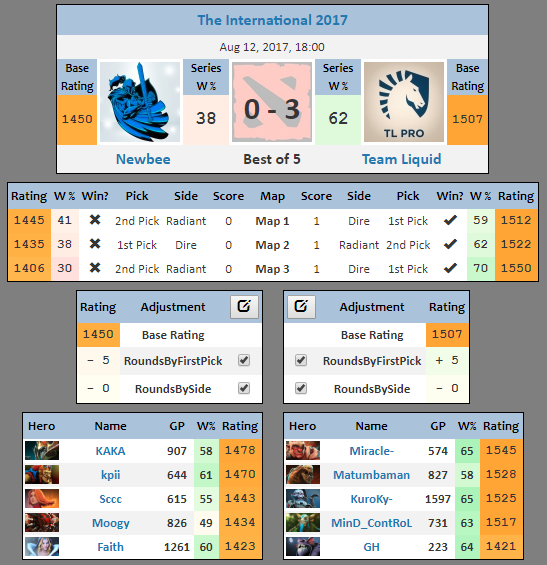
The esportsforecasts model projection from the Grand Finals of the 2017 International DOTA 2 tournamentWhile he can’t yet port in map picks in real time yet, he has left you the availability to do so at home and adjust your bets accordingly, hopefully allowing you to make value bets before the books can adjust their lines based on their projected performance of each team map to map. The model also makes similar adjustments for red vs blue side performance in League of Legends, first vs second pick performance in DOTA, etc, which are all facets an esports match bet that don’t really have a traditional sports analog. Esports sharps generally look to target these areas of volatility. The process of factoring these potential effects on the outcome of games is one he soon hopes to streamline, but for now bettors can foot the responsibility, or take to the Esportsforecasts Discord channel and see what other bettors following the model have to say.
But perhaps most importantly, Shea’s esports model is designed to rate the players on their own scale individually, in addition to generating team ratings. Esports contracts are fragile at best, to non-existent at worst, which leads to teams consistently dissolving and forming at a rate that drastically outpaces the four major sports, as well as a lot of expected turnover within a given roster. This, in combination with teams now carrying extra players on their roster more frequently, represents a need for the ability to quickly evaluate teams based on various lineups in order to find the value. So aside from the added wrinkle of giving a quantified take on who the best players around really are, rating the players individually also serves to stabilize the inherent volatility in Esports competition and isolate the bettor’s edge before the books adjust the lines. See a theme here?
One thing no model can account for however, is match fixing, a common problem bettors face when it comes to esports. Players are more easily convinced to throw matches given that the prize money on the table for winning tournaments, particularly smaller ones, often pales in comparison to what they could make throwing a game. In light of the recent Supreme Court decision allowing individual states the right to legalize sports gambling, expect to see the 18+ age restriction employed by most professional leagues become universal, as many have already raised concern that minors playing professionally could be seen as easy targets for match-fixers. Hopefully with rising prize pools, players won’t feel as though their hand is being forced and this eyesore on the community will be minimized, but fortunately for bettors, the books know that a match being fixed is a real possibility. Shea recalled multiple instances of Pinnacle in particular refunding/voiding bets he had placed on matches that had drawn suspicion. It’s like we’ve always said. Sportsbooks are nothing if not understanding!
By the time I got around to asking why he was posting all of this delicious content for us internet vultures to pick at for free instead of being in the business of selling picks, he replied swiftly, undoubtedly because he knew it was coming.
“Not yet.â€
Betting north of $1,000 a night on esports based on his model’s projections has worked generally worked out for him, but even he doesn’t bet every series. Discipline and knowing value bets when he sees them is how he has turned his gambling from a hobby into a career he can rely on. Even still, Shea says hes looking to make some subtle improvements before rolling out a subscription service for some added risk-free income and return on his time investment. He does plans to leave a free version open to the public for the foreseeable future.
You can find Marcus on Twitter: @esportsforecast

Parker Goss is a senior correspondent for Grandstand Central, where he writes about gambling, gaming, and fan culture. You can follow him here.
Source: https://grandstandcentral.com/what-its-like-wagering-400k-on-esports-f93dc2afd427
Tags: #smallcapstocks, $TSXV, CSE, eGambling, egaming, esports